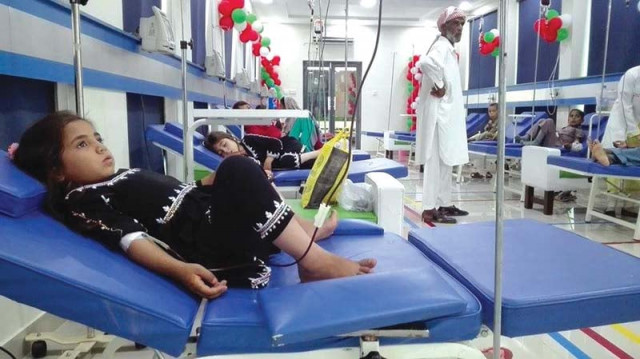Tackling thalassaemia: A simple test can save a life
Lack of screening and cultural practices proliferate disorder

Thalassaemia patients in the country have an average lifespan of 20 years. PHOTO: MARIAM SHAFQAT/EXPRESS
It is no secret that socio-cultural and religious factors play a major role in the prevention of thalassaemia, a hereditary disease, found mostly in predominantly Muslim countries.
Poverty, lack of awareness and cultural practices such as inter-cousin marriages are often blamed for the hereditary genetic disorder.

However, medical professionals such as Dr Farah Syed, a medical officer at Pakistan Thalassaemia Centre, say marriages among cousins cannot be blamed as the sole factor behind the disease.
A 2013 study carried out by Fatimah Jinnah Medical College on the frequency of thalassaemia found that inter-cousin marriages led to a 40 per cent higher risk of congenital transmission of the disorder.
The research showed that around 4.6 per cent of the country’s population is of thalassaemic careers, and that the trend of cousin marriages along with getting married at an early age is has led towards high risk of congenital transmission of the disease.
According to Syed however, though these marriages are a cause and should be addressed, the main problem remains a lack of awareness and poverty. A majority of thalassaemic patients are not born from parents who are cousins, she added.
She said unfortunately couples do not even know the name of the disease until they have given birth to a thalassaemic child.
“All that is needed is a simple test before getting married; if both individuals test positive, they should not get married,” Syed said.
“If a couple that is already married finds out that both of them are careers, they can opt for a parental test when the foetus is 10 weeks old, which can determine if the baby is healthy or not,” she added.
She said if the foetus is found to be thalassaemic, the parents need to make an informed choice and opt for an abortion.

Sharing a fatwa [Islamic ruling] issued by a prominent religious scholar in favour of abortion, Syed said religious scholars had a role in educating the public in this regard.
The disease is also found in counties like Cyprus, Italy and Greece, said the medical expert, but adding that these countries have rigorous testing and screening mechanisms in place for couples choosing to marry or have children.
As a counsellor to parents who are registered at the centre, Syed says the issue sometimes is less about awareness and more about affordability.
“For example, iron-chelation therapy is an important part of thalassaemia treatment and costs Rs9,000 per month, which is simply not affordable for many patients,” she said.
Due to a lack of awareness and low levels of therapy, patients in the country do not live longer than 20 years, whereas in developed countries the life span of the average thalassaemic patient is 50 years.
Published in The Express Tribune, October 12th, 2015.



















COMMENTS
Comments are moderated and generally will be posted if they are on-topic and not abusive.
For more information, please see our Comments FAQ